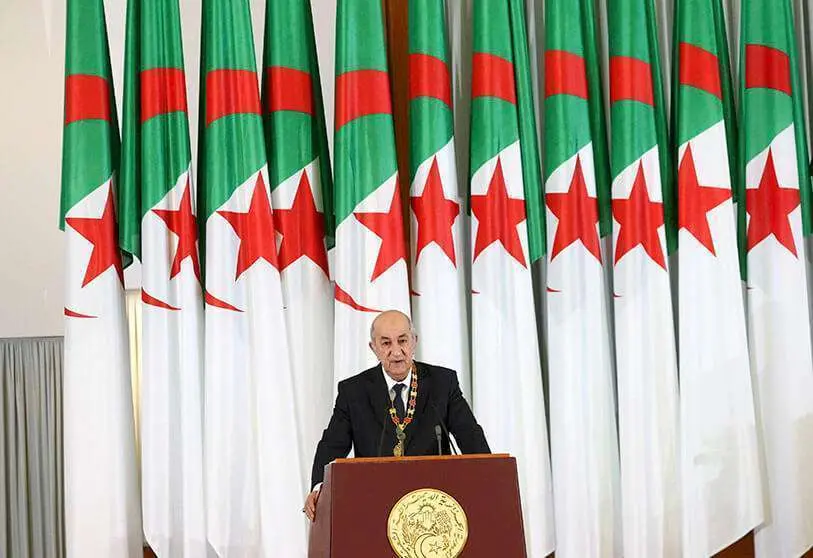Argelia: la Presidencia de la República recupera los poderes constitucionales

The conflict in Western Sahara has moved from a purely regional crisis based on geopolitical rivalry between Algeria and Morocco to an internal conflict in Algeria. For four decades, from the beginning of the armed struggle between the Polisario Front guerrillas and the Moroccan Armed Forces, the conflict in the Sahara was considered by Algiers as "an external problem" with little impact on the country's internal affairs.
At none of the critical moments experienced in Algeria since then, the death or assassination of President Boumédiène, the popular uprising of 1988, the Islamist insurgency of the 90s and the bloody decade that followed, the assassination of President Boudiaf and the profound institutional crisis that brought Abdelaziz Bouteflika to power, did any of this affect the issue of the Sahara. Algiers had always considered it an "international affair" and all the Algerian factual powers, including the Presidency of the Republic, even if they held different positions, bowed down to the "diktat" of the army and its security services, which manipulated the reins of conflict.
The attempt by President Bouteflika in July 1999, during the funeral of King Hassan II of Morocco, to reach an agreement in Rabat with the King of Morocco and the Algerian President based on the American umbrella and James Baker's plan, initiating a rapprochement with the Alaouite monarchy with the eyes of the Great Maghreb project, was a dead letter. Bouteflika, as he himself would later admit, never had the power of decision on the question of the Sahara.

The current Algerian president, Abdelmadjid Tebboune, decided days ago to send a show of support to the Tindouf camps with 150 tonnes of technical, health and food material to help the tens of thousands of refugees in tents withstand the onslaught of the potentially extremely lethal spread of the coronavirus. This aid is also a clear message to the military establishment of the country: the crisis in the Sahara is a political-military issue which the new head of state assumes as his own; strictly military matters for the military; geopolitical and strategic matters for the head of state.
The sending of five cargo planes to Tindouf with the aid is, moreover, a step in the right direction with the practice put in place by the former head of the army, General Gaïd Salah, who went so far as to prevent the supply of medical and food material to the camps, by being blocked at the port of Oran and by closing the border with Mauritania, preventing Saharawi traders from transporting goods and supplying the camps, where everything is imported. The reasons for the military general staff were strictly linked to the security of the territory and national sovereignty, the main mission of the armed forces. The situation of the refugees was put on the back burner.
Meanwhile, the Polisario leader Brahim Ghali planned to populate the part of Western Sahara situated between the Moroccan walls and the two neighbouring countries, Algeria and Mauritania. A measure of little scope, since the barracks of the guerrilla army will remain in Algerian territory and, therefore, prevented from acting in their own way.

Abdelmadjid Tebboune has flanked two influential advisors in the military and security ranks: Major General Abdelaziz Medjahed and Colonel Chafik Mesbah. The first, as the president's military and security advisor; the second, as head of the Foreign Policy Council. General Medjahed has two irreplaceable merits for the president: he was director of the Cherchell Military Academy, which all high-ranking officers have attended, before completing a portion of their curriculum at the military academies of Russia, France and the United States primarily. In addition, General Medjahed, who directed the Air Force, the most numerous and best equipped in the Maghreb, seems to have excellent relations with the current interim Chief of Staff, General Chengriha, who replaced General Gaïd Salah, who died at the end of last year, in his strategic position.
General Medjahed is credited with the idea of pardoning Generals Khaled Nezzar and Toufik Mediène, on condition that they rule out the idea of a return to political action. Nezzar, exiled in Spain, was head of the general staff and defence minister, and Mohamed 'Toufik' Mediène, currently in prison, is head of the secret services.
For analysts in the Maghreb, as long as the Algerian military command controlled the crisis in the Sahara, there could be no solution to the conflict. If the matter passes to the Presidency, a solution is possible. It is up to the main and secondary actors to seek one.









